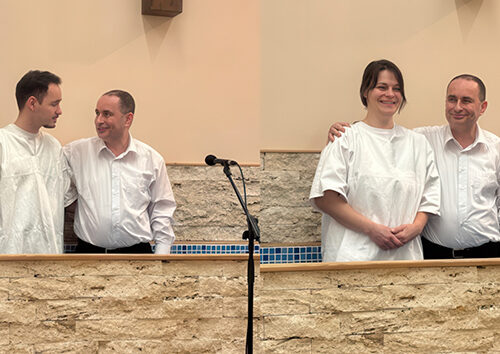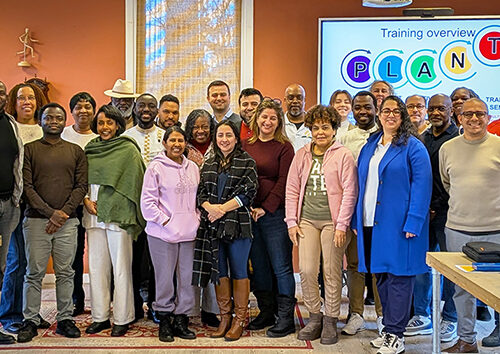14 April | Friedensau Adventist University, Germany [Vanesa Pizzuto]
It all started in 2022, during the Pan-European Adventist Youth Congress (AYC), in Lahti, Finland, with the programme including a couple of workshops on human sexuality. These were so popular and overbooked, they needed to be repeated. With multiple questions shared by the teens, leaders became convinced that more needed to be done to support young people in this area, and to give them hope when searching for answers to complex issues.
After much planning and prayer, sixty Family Ministries leaders from across the Trans-European (TED) and Inter-European (EUD) Divisions gathered at Friedensau Adventist University, Germany, from 14 to 16 April, to explore a biblical view of sexuality. “Young people have so much distress and confusion around unhealthy sexuality,” explained Karen Holford, TED Women’s, Children and Family director, and event organiser. “We need to speak out, compassionately, graciously, and clearly, about what is healthy sexuality. Because if we don’t, they will find answers from other sources, that could lead them to shame, guilt and distress.”
The conference included a variety of presentations from theologians, doctors, psychologists, and psychiatrists from around the world. Daniel Duda, TED president, set the tone for the conference with a sermon and a plenary session. In his Friday night sermon, Duda explored the story of Mary and Joseph. Emphasising how protecting Mary cost Joseph his reputation as a ‘righteous man,’ Duda highlighted, “if reading the Bible gives you justification for abusing, humiliating, disgracing, harming, or hurting other people; or it makes you feel better than others, you are reading the Bible absolutely wrong.” During his plenary session, titled “God, Bible, Sex and Us,” Duda explained the development of the concept of the body in theology, and the biblical principles for human sexuality. These two initial presentations provided a wonderful and foundational framework, a space for conversations guided by strong biblical values, humility, and compassion.
What follows is not a summary of every presentation, but a brief glimpse of some of the pressing issues regarding sexual education facing both the Church and society. We will continue to bring other presentations from the conference in following issues of tedNEWS.
On being a safety net
With her usual blend of hard research data and contagious empathy, Mary Jo Vollmer-Sandholm explored current issues in sexuality. Vollmer-Sandholm, a Doctoral Fellow in the Department of Forensic Medicine at Oslo University Hospital, Norway, compellingly challenged participants to create the safe places teens and young adults can go to when they need help. Drawing from over 20-years of experience in paediatrics forensics, Vollmer-Sandholm used cases to illustrate the complex reality teens and young adults navigate each day. How can we help a person struggling with pornography? Or a teenager being pressured to send nude pictures?
Her presentation “Sex and Relationships off the Rails” highlighted the importance of keeping the lines of communication open. With “Teen’s frontal lobes not yet fully developed,” explained Vollmer-Sandholm,”combined with the surge of hormones, and peer-pressure, it can lead them to make poor decisions they regret almost immediately.” Parents who meet such episodes of poor judgment with kindness, and navigate consequences with wisdom, are providing their children with a much-needed safety net. “I want to be a soft-landing place for my children,” Vollmer-Sandholm remarked. “I want them to know that no matter what kind of trouble they get into, they can always come to me.”
Vollmer-Sandholm also led two workshops “Religion and Abuse” and “Pornography, Shame, and Healing.”
The consent mythbuster
Ansku Jaakkola, a pastor and Couples in Crisis® counsellor from Finland, explored issues of consent. Armed with a direct style and scientific data, Jaakkola busted common myths on the topic: Does consenting once mean that you are always giving consent? “No. You can rape your spouse,” Jaakkola remarked. Is it OK to have sex with your spouse while he/she is asleep, or irresponsive for any other reason? “Absolutely not!”
If your body is turned on, does this means you are giving consent? “No.” Why? Because of arousal non-concordance, a common phenomenon,¹ which means your physiological response doesn’t align with your subjective arousal. “Arousal is context-dependent,” Jaakkola remarked, emphasising the importance of paying attention to what a spouse is saying, not just to his/her bodily reactions.
“Well, you got aroused, so you must have liked it!” is an abusive and completely unscientific way to think about consent and sexuality, Jaakkola asserted. This is important because, for many trauma survivors, understanding that a sexual response can be the result of nerve endings being stimulated (and not their desire), is both liberating and deeply healing.²
In addition to the plenary session, Jaakkola led a workshop titled “Healing the Orgasm Gap.”
Attachment and sex drive
Dr Torben Bergland, General Conference Health Ministries Associate Director, explored the connection between attachment styles and sexuality. Attachment styles – secure, anxious, avoidant, and disorganised, according to John Bowlby’s theory,³ form early on in life in response to the degree of attunement we receive from our caregivers. Attachment styles shape the way we bond with people as adults, and, unsurprisingly, our sex lives too. “People with an anxious attachment tend to have more frequent sexual experiences,” shared Bergland, quoting from different studies, while those with an avoidant attachment style “perceive their sex drive as relatively low.”
Realising that your sex drive (or your spouse’s) could have more to do with an attachment style than personality may surprise you. Perhaps for this reason, Bergland joked that, “People should not get married before learning about Attachment Theory.” This learning, of course, is about negotiating differences with respect and self-awareness.
Holding space
In all honesty, not everyone agreed what with was said, and people were free to express variant views. However, I think this was one of the greatest achievements of the conference. Exploring a topic as relevant as sex in a sensitive, mature, deeply spiritual, and non-polarising way, is no small accomplishment! In a world where cancel culture is often more popular than tolerance, seeing leaders hold space for dialogue was truly inspiring. Because as Duda remarked, “Trying to find how the Church can inspire hope and be a safe place, while upholding biblical values, is crucial if we want our young people to see the Church as relevant for their lives.”
Perhaps one of the most moving moments took place during the panel discussions. One of the questions submitted by the audience read: “If shame does not work to educate/modify people’s behaviour, what does?” Psychiatrist and CBT Psychotherapist, Helgi Jónsson, who during his plenary presentation focused on dignity as a fundamental principle of healthy relationships, and explained the effects of shame on the brain, provided a powerfully simple answer: “Love and compassion.”
¹ Current research shows only a 10% overlap between women’s genital responses and subjective arousal. Meanwhile, there’s a 50% overlap between men’s genital response and subjective arousal [Source: Come as you are: The Surprising New Science that Will Transform Your Sex Life, by Emily Nagoski Ph.D].
²“Understanding this difference is essential in moving forward discussions of sexual assault. Survivors of sexual assault are often discredited and dismissed or told they’re not ‘true victims’ because they may have produced a physiological response… [However] physiological arousal isn’t indicative of subjective sexual arousal or consent, so this argument is completely baseless. Consent can and should only be determined through active engagement and verbal confirmation.” [Source: What Is Arousal Non-Concordance?, by Ellie Cooper].
³More on attachment theory: Attached: The New Science of Adult Attachment and How It Can Help You Find—and Keep—Love, by Amir Levine, and Rachel Heller.
[Photos: Vanesa Pizzuto, AME -CC BY 4.0].








